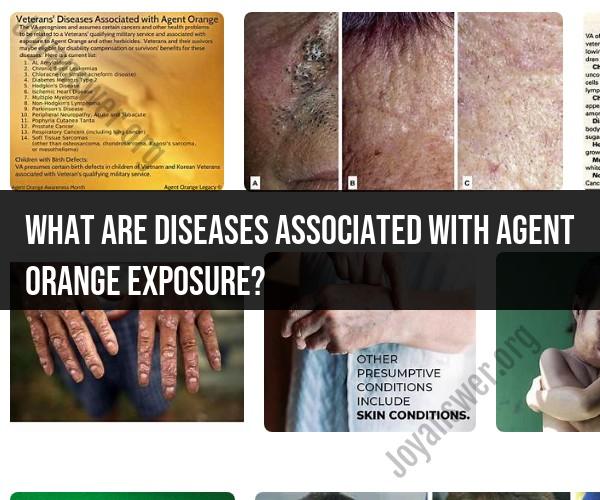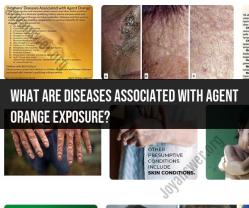What are diseases associated with Agent Orange exposure?
Exposure to Agent Orange, a herbicide and defoliant used during the Vietnam War, has been linked to various health conditions and diseases among military personnel and civilians who came into contact with it. Agent Orange was contaminated with a toxic chemical called dioxin, specifically 2,3,7,8-tetrachlorodibenzo-p-dioxin (TCDD), which is known to be harmful to humans. The U.S. Department of Veterans Affairs (VA) recognizes a range of health conditions and diseases associated with Agent Orange exposure for the purpose of providing healthcare and compensation to eligible veterans. Some of the diseases and health conditions associated with Agent Orange exposure include:
Type 2 Diabetes: There is an increased risk of developing type 2 diabetes among individuals with a history of Agent Orange exposure.
Hodgkin's Disease: This is a type of lymphoma, a cancer of the lymphatic system. Agent Orange exposure has been associated with an increased risk of Hodgkin's disease.
Non-Hodgkin's Lymphoma: Similar to Hodgkin's disease, non-Hodgkin's lymphoma is a cancer of the lymphatic system, and Agent Orange exposure has been linked to an elevated risk.
Chronic Lymphocytic Leukemia (CLL): CLL is a type of leukemia that affects white blood cells. Agent Orange exposure has been associated with an increased risk of CLL.
Soft Tissue Sarcomas: Soft tissue sarcomas are cancers that develop in the body's soft tissues, such as muscles and connective tissues. Several types of soft tissue sarcomas have been linked to Agent Orange exposure.
Ischemic Heart Disease: This includes conditions like coronary artery disease and heart attacks. Veterans with Agent Orange exposure may be at an elevated risk of ischemic heart disease.
Parkinson's Disease: Agent Orange exposure has been associated with a higher risk of developing Parkinson's disease, a neurodegenerative disorder.
Prostate Cancer: There is evidence to suggest that Agent Orange exposure may increase the risk of prostate cancer.
Respiratory Cancers: Cancers of the lung, trachea, bronchus, and larynx have been linked to Agent Orange exposure.
Chronic B-Cell Leukemias: Certain types of chronic B-cell leukemias have been associated with Agent Orange exposure.
Peripheral Neuropathy: Some veterans have reported peripheral neuropathy as a result of Agent Orange exposure, which affects the nerves in the extremities.
Porphyria Cutanea Tarda: This is a skin condition that can occur due to dioxin exposure, and it has been associated with Agent Orange exposure.
It's important to note that the VA continues to research and monitor the health effects of Agent Orange exposure, and the list of associated conditions may evolve over time. Veterans who believe they may have been exposed to Agent Orange and have developed any of these conditions should contact the VA for information about healthcare and compensation benefits.
Additionally, civilians who lived in or near areas where Agent Orange was sprayed and may have been exposed to it should also be vigilant about monitoring their health and seeking medical advice if they experience any related symptoms or conditions.
Diseases Linked to Agent Orange and Dioxin Exposure
Agent Orange is a defoliant herbicide that was used by the United States military during the Vietnam War. It contains dioxin, which is a highly toxic chemical. Exposure to Agent Orange and dioxin has been linked to a number of diseases, including:
- Cancer: Agent Orange has been linked to a number of cancers, including non-Hodgkin lymphoma, Hodgkin lymphoma, leukemia, prostate cancer, and lung cancer.
- Cardiovascular disease: Agent Orange exposure has been linked to an increased risk of heart disease, stroke, and high blood pressure.
- Respiratory problems: Agent Orange exposure can cause a variety of respiratory problems, including asthma, chronic obstructive pulmonary disease (COPD), and bronchiectasis.
- Neurological problems: Agent Orange exposure can cause a variety of neurological problems, including peripheral neuropathy (nerve damage), Parkinson's disease, and Alzheimer's disease.
- Skin problems: Agent Orange exposure can cause a variety of skin problems, including chloracne, psoriasis, and eczema.
- Birth defects: Agent Orange exposure has been linked to a number of birth defects, including cleft lip and palate, spina bifida, and intellectual disabilities.
Managing Health Conditions Tied to Agent Orange
If you have been exposed to Agent Orange and are experiencing any health problems, it is important to see a doctor. Your doctor can help you to manage your health condition and monitor your symptoms for any changes.
There are a number of treatments that can be used to manage the health conditions that are linked to Agent Orange exposure. These treatments may include medication, surgery, and rehabilitation.
It is also important to make lifestyle changes to help manage your health condition. These lifestyle changes may include eating a healthy diet, exercising regularly, and quitting smoking.
Seeking Compensation for Agent Orange Exposure
If you have been exposed to Agent Orange and are experiencing health problems, you may be eligible for compensation. The United States government has established a number of programs to compensate veterans and their families for Agent Orange exposure.
To learn more about your eligibility for compensation, you can contact the Department of Veterans Affairs (VA) or a qualified attorney.
The VA has a number of resources available to help veterans and their families who have been exposed to Agent Orange. These resources include information about compensation programs, healthcare services, and support groups.
If you are a veteran or the family member of a veteran who has been exposed to Agent Orange, please do not hesitate to reach out for help. There are people who care about you and want to help you get the support you need.


